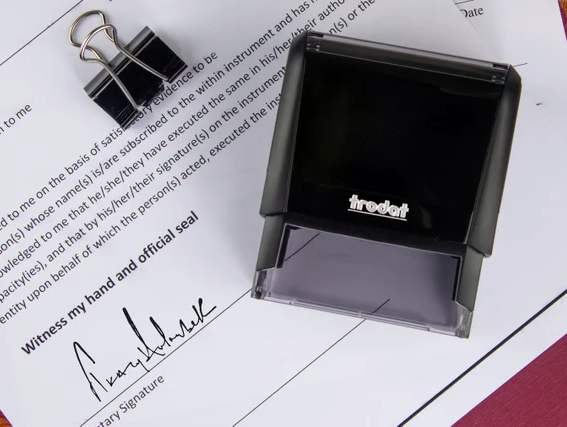In a world where digital transactions and communications have become the norm, the need for secure and authentic verification methods has never been more critical. One such method that has stood the test of time is using a stamped signature. These tangible imprints not only provide a sense of authenticity but also serve as a reliable means of verification. In this article, we will explore the signature of authenticity and use it for verification.
The Power of the Stamp:
When you receive a document with this signature, it carries a unique weight. It is more than just ink on paper; it represents a commitment, an endorsement, and, most importantly, authenticity. Here’s how these are used for verification in various contexts:
Legal Documents:
In the legal realm, authenticity is paramount. These are commonly used on legal documents such as contracts, wills, and deeds. These stamps often symbolize a notary public or an authorized entity. Their presence signifies that the document has been reviewed, verified, and found to be legitimate. These signatures carry immense weight in courtrooms, providing a clear and tangible record of authenticity.
Financial Transactions:
In the world of finance, where the value of transactions can be staggering, it plays a crucial role. Bank documents, loan agreements, and checks often feature signatures from authorized personnel. These stamps guarantee that the document is genuine and has passed through the proper channels. When it comes to monetary transactions, there’s no room for doubt, and these offer that assurance.
Authentication of artwork:
For art connoisseurs and collectors, the authentication of artwork is a significant concern. These signatures by renowned artists or art experts authenticate the origin and provenance of a piece of art. The presence of such a stamp can significantly increase the value of an artwork, and buyers can be confident that they are investing in a genuine masterpiece.
Certification and Quality Control:
These are used for quality control and certification in manufacturing and industrial settings. When a product passes quality checks, it often receives stamped approval from an authorized inspector or supervisor. This stamp signifies that the product meets the required standards and is fit for distribution or use. It’s a clear mark of authenticity in the production process.
Notarization:
Notaries public are entrusted with verifying the authenticity of documents and signatures. Their stamped seals and signatures on documents guarantee that the signatories are who they claim to be and that the document is legally binding. This is particularly important for sensitive documents like powers of attorney, affidavits, and property deeds.
Benefits of This for Verification:
These offer several advantages over purely digital signatures or handwritten ones. Here are some of the key benefits:
Tangible Proof:
It leaves a physical mark that is difficult to replicate or tamper with. This tangible proof of authenticity can be crucial in legal disputes and high-value transactions.
Established Trust:
Over time, these have built a reputation for trustworthiness. People instinctively trust the authenticity of this signature more than a digital or handwritten one.
Deterrence Against Forgery:
The difficulty of forging this signature is much higher than that of replicating a digital or handwritten one. This acts as a deterrent against fraudulent activities.
Legal Recognition:
Many legal systems recognize and give weight to these signatures, making them a valuable tool for legal verification. Learn More on Wikipedia
Conclusion:
In a world where identity theft and forgery are on the rise, the signature of authenticity provided by a stamped signature is a reassuring beacon of trust. Whether in legal documents, financial transactions, art authentication, quality control, or notarization, the presence of a signature signifies reliability and authenticity. As we navigate the digital age, it’s important not to forget the power of tangible, time-tested verification methods like these signatures. They continue to play a vital role in ensuring the authenticity of our most important transactions and documents, providing unparalleled trust. So, the next time you come across a signature, remember that it’s not just ink on paper; it’s a symbol of authenticity and trustworthiness.













